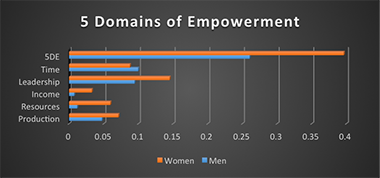The following post was originally published on the Agrilinks site.
Niger is a hot landlocked country, mostly covered by the Sahara desert with a rainy season of only three months. Despite this unforgiving environment, it has made impressive economic progress lately. In 2014, economic growth accelerated to 6.5 percent, thanks to a rebound in agriculture and large public investment projects. However, the country lags considerably in gender equality and social inclusion, especially in political empowerment and economic participation.
Discriminatory family codes, customary laws, and practices limit and restrict women’s reproductive rights as well as their access to services, resources, and entitlements. As my recent research shows, this disempowerment of women critically affects the country’s agricultural production and productivity.
Measuring empowerment for rural smallholders
Agriculture in Niger remains largely smallholder based with women playing an important role in the production, processing, and commercialization of commodities, whether as individuals within households, heads of households, and/or as owners of small or informal businesses. The disempowerment they experience, however, means they are often invisible in agriculture: women usually do not receive extension services, agriculture and market information, or inputs to increase their productivity. In my study, I used the Women’s Empowerment in Agriculture Index (WEAI)—a survey-based tool designed to measure the empowerment, agency, and inclusion of women in the agricultural sector—to calculate in what ways women and men in farming communities are disempowered.
Gender disparity in empowerment exists
The index comprises five domains of empowerment: decisions about agricultural production, access to and decisionmaking power about productive resources, control of use of income, leadership in the community, and time allocation.
My colleagues and I collected individual data on empowerment, using the WEAI tool, in 500 households in the Tahoua region of Niger. We find, as shown in Figure 1, that women are significantly more disempowered in all but one domain. Figure 1 also shows that leadership— group membership and ability to speak in public—and access to and decisionmaking power about productive resources are particularly important contributors to disempowerment of women.
Empowerment matters
We also used the WEAI to assess the role of empowerment of both males and females in agricultural production at the household level and find that more empowered households are also more productive. When we interact empowerment with traditional inputs—land, labor, fertilizer, and agricultural equipment—in an agricultural production function, we see that this is because empowerment positively affects returns to labor and equipment. For example, membership in a producer organization, a contributor to empowerment, would give a household access to information, allowing it to use its labor and equipment more efficiently.
Disempowered within the family
The WEAI can also be used to compare intra-household gender parity in households that contain both a male and a female adult, usually husband and wife. What we see for Niger is that in households with both an adult male and female, women are comparatively much less empowered than their counterparts in households containing only an adult female, for example households in which the husband has passed away. In fact, we find that average empowerment affects agricultural production more in households containing both an adult male and an adult female. This means that the relatively disempowered status of women in these households has particularly negative repercussions for agricultural production and productivity.
Lessons to take away
Empowerment matters for agricultural production. Less empowered households experience lower returns to their labor and use their traction equipment and animals in a less effective manner. Women are much less empowered in so-called dual households where a primary male is also present. Increasing the empowerment of these women, for example, through leadership training or encouraging membership in groups (rotating savings schemes or producer organizations) will ultimately generate benefits in terms of increased food production.







